5 Insights From Pioneering People Leaders About HR Burnout

Gillian French
Employee Experience Officer
12 Jul 2022

What’s causing unprecedented levels of HR burnout across the world? What can we do to overcome it? Some of our HR heroes share their thoughts.
One of the best things we can do in the HR community is to talk to and learn from each other.
Over the past few weeks, I’ve had the privilege of hosting Workvivo’s HR Burnout LinkedIn Lives series. I talked to five inspiring trailblazers who are pushing the needle in compassionate leadership, people management, internal comms, and more about the results of our research into the HR burnout crisis.
I’m eager to share some of the ideas my guests brought to our conversations to help us better understand the challenges facing HR professionals today, and what we can do to better support them.
1. It can be hard to demonstrate your value as a HR professional – but it’s not impossible
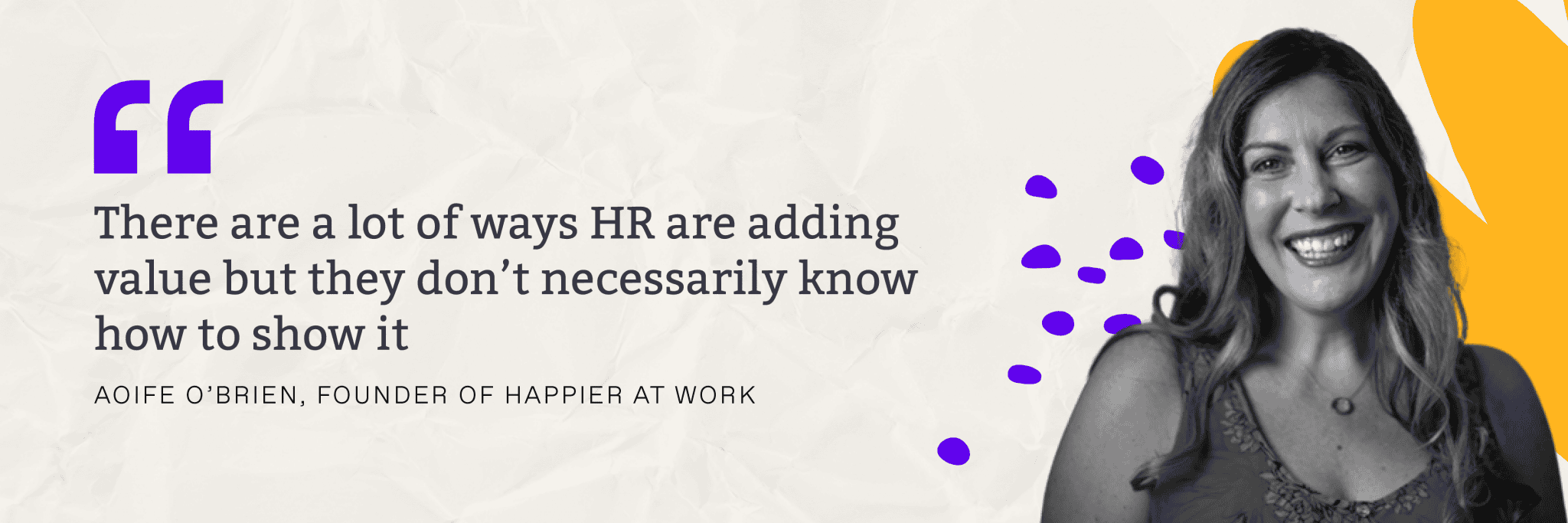
Aoife O’Brien, Founder of Happier at Work, hosts one of my all-time favourite podcasts – the Happier at Work Podcast. I was delighted to have her join our HR burnout series as she has a wealth of knowledge and experience in improving the employee experience.
For HR professionals in particular, Aoife noted that it’s often difficult to actually demonstrate the value we’re adding to our organizations. That’s especially true compared with other departments like finance and marketing, where it’s typically much easier to show the return on investment.
It comes back to getting recognized for the value added by HR, and Aoife shared that the first major step is understanding that value yourself.
“There are a lot of ways HR are adding value but they don’t necessarily know how to show it,” she said. “Get out of that operational day-to-day mindset and think strategically about the project you have going on at the moment.”
She gives the example of delivering a retention program. If you can work out the cost to the company of someone resigning and predict how many people would leave in a certain timeframe, you can present clear data on how much money you’re saving the organization.
But it can even be as simple as keeping a log of the things you do, such as the number of conversations you’ve had with people in the business to help build camaraderie and engagement.
It’s difficult to demonstrate the value of HR when they don’t have a place at the C-suite table. I often see it as if every other director in the company has a full seat at the table, while HR only has a deck chair. It’s frustrating because from the outset you’re not on a level footing.
Aoife agreed, adding: “You can just fold up that deck chair and pull it away at any time.”
Catch up on Aoife’s episode here.
2. HR professionals aren’t unicorns
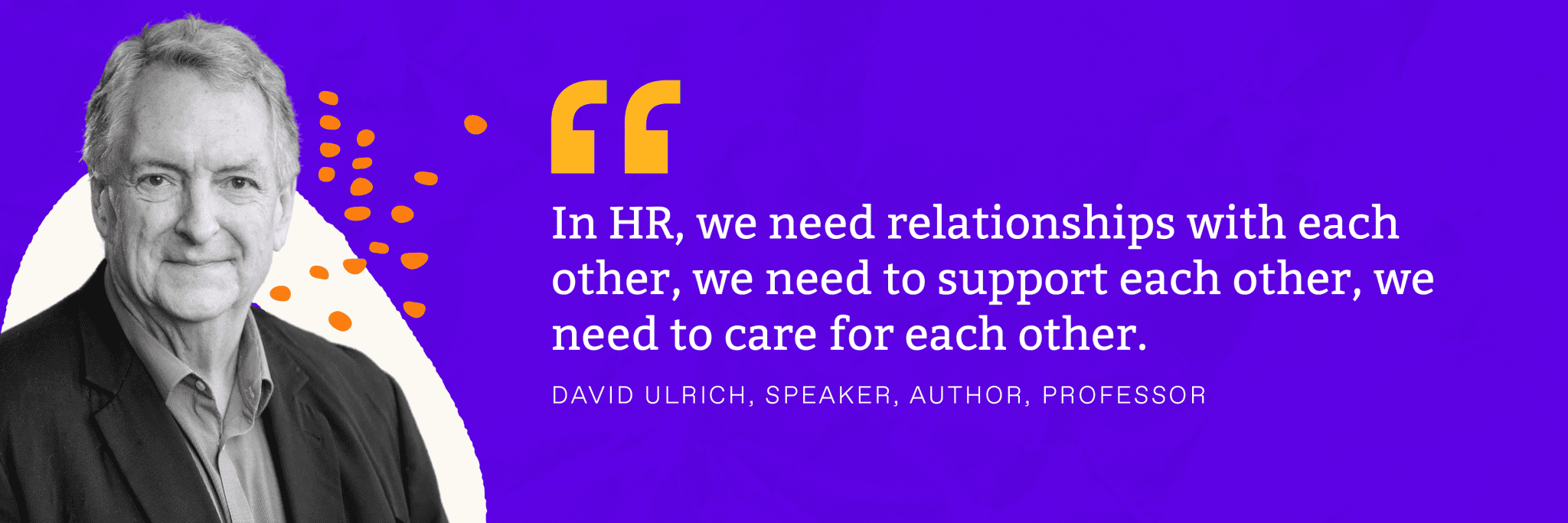
In any conversation about HR, David Ulrich’s voice will come as no surprise. David is known as the father of modern HR and has been ranked as the number-one management guru by Business Week. Fast Company also listed him as one of the world’s top-five creative people in business.
During our chat, David touched on some of the issues many of us are familiar with in the HR industry. “HR is the emotional first responder,” he said. “And it’s not a surprise that we face the demands of that.
“When more is expected, more has to be given. Think of a high-end fancy restaurant and a low-end diner. Which one gets more complaints? The high-end place, because the expectations are there.”
In the face of all of this, David wants people in the HR community to remember that we’re stronger together – that we need to look out for one another. Two of the most critical predictors of a good HR department, he said, are having a clear mission around helping others to be successful, and the relationships we have with each other.
“In HR, we need relationships with each other,” he explained. “We need to support each other, we need to care for each other. And the community among HR people becomes a real source of strength because we nurture, we care for – we help each other be more successful and in so doing we help build the mental health of the employees.
“And there is an enormous amount of research that the employee experience is a lead indicator of the customer experience – that if we want to be successful in the marketplace, we have to be successful with our employees. And HR is an architect of that relationship.
“You’re not a unicorn, you don’t stand alone. The collective is more important than the individual.”
Listen to our full conversation here.
3. Making room for joyful moments in your day can help you come back from HR burnout
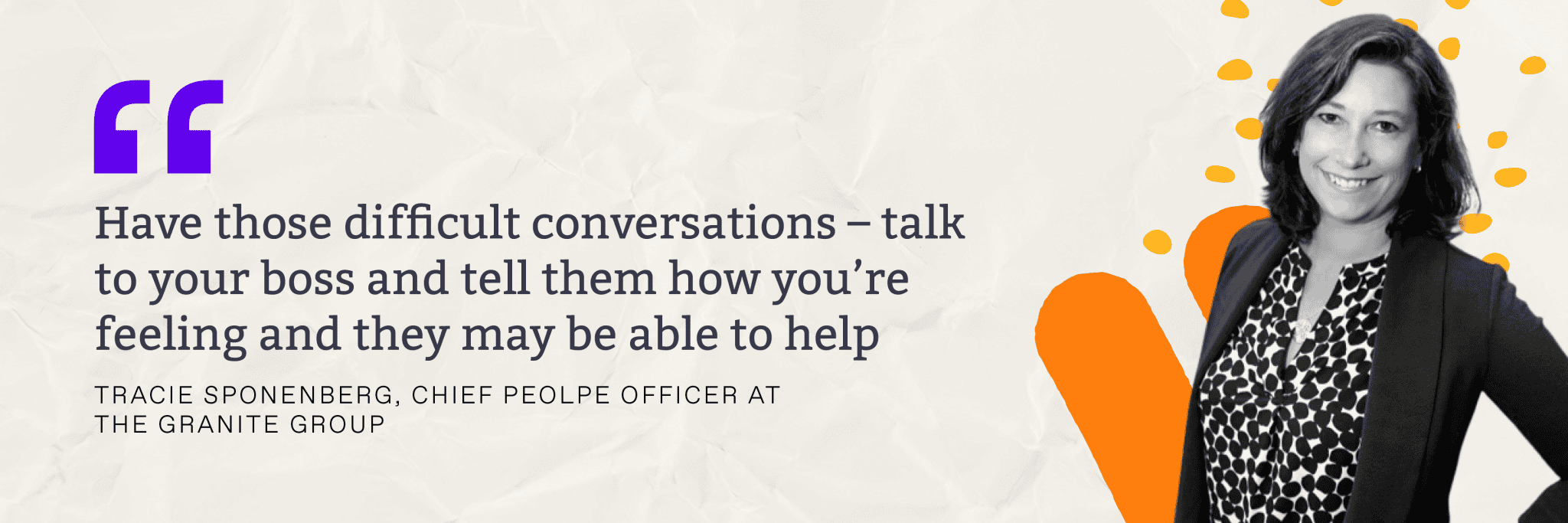
With burnout so prevalent in the HR community, how can you arm yourself with the tools to recover from it?
Tracie Sponenberg has had plenty of practise and shared some her experiences with me. Tracie is Chief People Officer at The Granite Group and a keynote speaker on HR, tech and more. She is also a Founder and Board Member of various programs in business and best practice.
With so much experience in the field, Tracie knows that HR can be a lonely role and that burnout can present itself in different ways. In practical terms for preventing burnout, her tips are to build your network and lean into that for support and to connect with others, but also to prioritize yourself.
While supporting those around you can help fuel your recovery, she said, it’s just as important to rediscover the love and passion for what you do every day – both in and out of work. Speaking about her own experience of burnout recovery, she said it didn’t truly happen until she did something 100% for herself.
“I went to a concert in New York City that was 100% pure joy,” she said. “Everything was perfect; I felt pure joy for the first time in a long time.
“So I think it’s doing the things that are really difficult when you’re in the burnout, and finding the things that claw you back out. And have those difficult conversations – talk to your boss and tell them how you’re feeling and they may be able to help.”
Watch Tracie’s LinkedIn Live session here.
Practical steps for burnout recovery
- Make room for happy moments
- Prioritize yourself
- Connect with your network and friends
- Do more of what you find joyful in work
- Ask for help
4. Don’t quit too soon – if you can, talk to your boss first
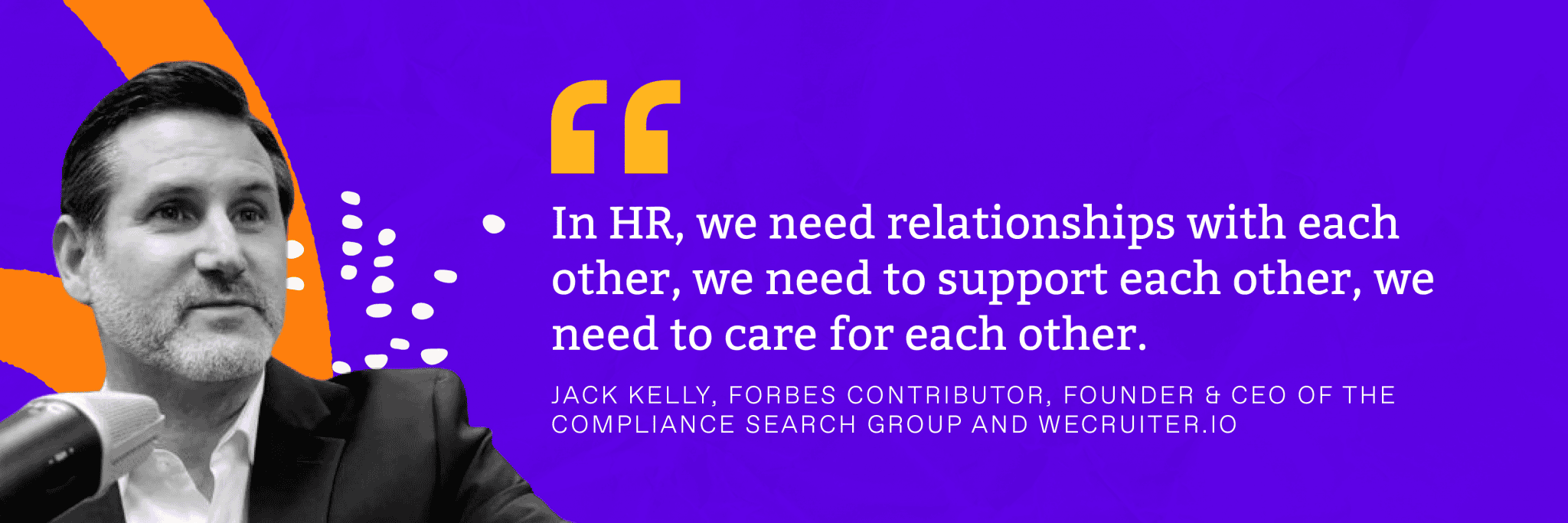
HR professionals have been under pressure in the wake of the Great Resignation, which is seeing people quit their jobs at unprecedented rates. But similarly, HR employees are seeking pastures new – 78% are open to leaving their jobs.
Jack Kelly, a Forbes contributor and Founder and CEO of The Compliance Search Group and Wecruiter.io, shared his advice. While Jack believes that the HR industry will be navigating “turbulent waters for a while”, he doesn’t think it’s a good idea to jump ship too soon.
“Now, the way the market is, I wouldn’t feel confident telling somebody to take a chance and leave, because they might be the last one hired and the first one fired,” he said. “It’s rough, but you may have to hunker down and wait it out.”
While it’s important to set boundaries and know when enough is enough, make sure you take the time to consider your options and talk to your manager before handing in your resignation.
Jack added: “For the first time, people are really talking about mental health and burnout, and they’re leaving. And that’s a drastic move. Especially in this market, I wouldn’t encourage people to do that right away.
“I would encourage people to speak to their boss and be open. It’s going to be hard and awkward, but I think it’s better than just saying, ‘I’m outta here’.”
You’ll find Jack’s episode here.
5. Saying no is a critical skill for anyone working in HR
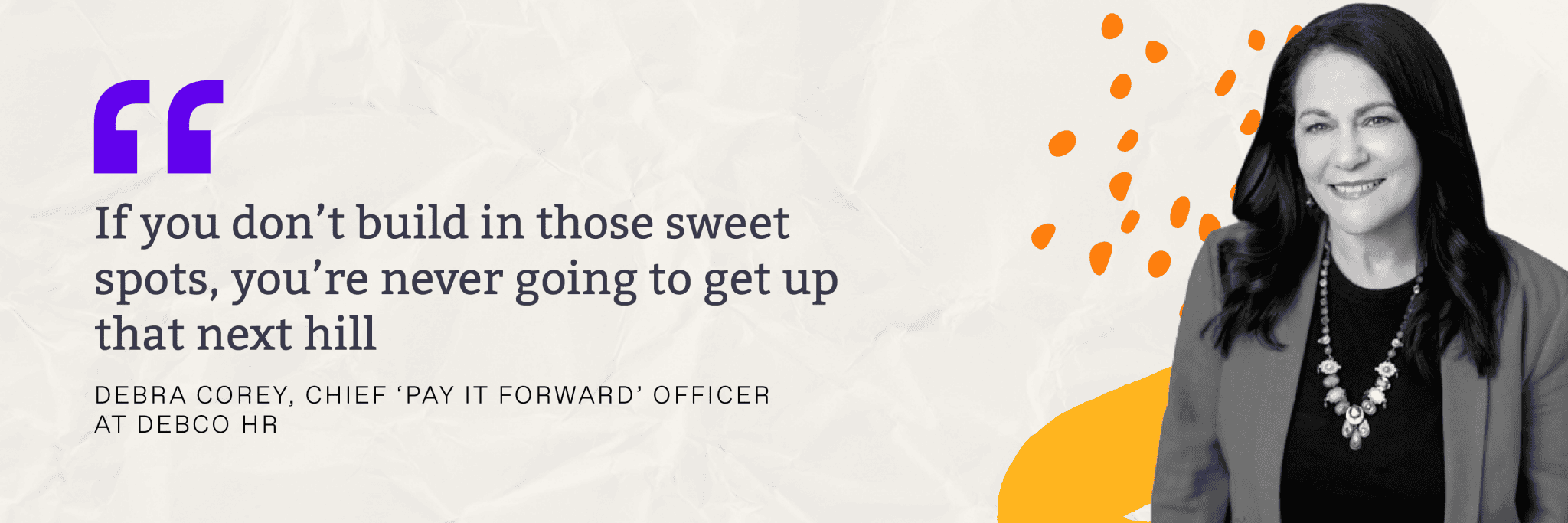
Another HR professional with vast experience in the field is Debra Corey, who is now Chief ‘Pay it Forward’ Officer at her company DebCo HR.
Debra sees the neverending list of roles HR has to occupy as one of the contributors to burnout. “We’re a firefighter, we’re a medic, we’re a fortune-teller – we have so many different hats that we have to wear now that we weren’t asked to wear before,” she said.
Taking on those duties can be especially tough when we feel like we’re not appreciated – something 71% of HR professionals are experiencing. “I think sometimes they take us for granted,” Debra said. “It’s almost like we make it look too easy. We just get out and do things, and sometimes that makes things harder for us because the expectation is there that we’re always going to be superheroes.”
To help prevent burnout, Debra says we must learn to say no. “The good thing about being in a profession for a very long time is that you’ve gone through the peaks and troughs yourself,” she said.
“Too often, many of us just don’t want to say no. Early on in my career I would never say no to anyone. It wasn’t until I got myself in a hole and my team was small and I had huge commitments that I realised that I had to start saying no.
“It’s about learning to say no in a strategic and business-focused way. Sometimes we’re our own worst enemy in trying to take on too much.”
Saying no will also help you build in time for recovery. To make the most of these breaks, Debra encourages us to find our “sweet spot of relaxation”.
She said: “If you don’t build in those sweet spots, you’re never going to get up that next hill.”
Hear more in Debra’s session here.
The biggest takeaway…
Our HR Burnout series was an invaluable space for me and my guests to discuss issues in the industry. Keeping the conversation going will be key to navigating those obstacles and overcoming the challenges ahead.
The through line of every episode, something that I wholeheartedly agree with all of my guests on, is that we’re all in this together. No HR professional is an island, and that only becomes more true in choppier waters.